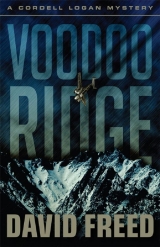
Текст книги "Voodoo Ridge"
Автор книги: David Freed
Жанр:
Триллеры
сообщить о нарушении
Текущая страница: 13 (всего у книги 17 страниц)
“Hello?”
“It’s Gil Carlisle.”
I offered the only words I could think to say.
“I’m so sorry.”
“You should be, you son of a bitch.”
Gone was the deceptively honeyed twang in his voice. Gone, too, was any semblance of the weeping, disconsolate father. The Gil Carlisle on the other end of the line was a man, in the parlance of his native West Texas, fit to be tied. He told me he couldn’t believe it when Savannah called him, to tell him we were getting remarried. He counseled her against it, he said, told her I was a loser, and that’s what I’d always be. But she wouldn’t listen to him.
“Why did you have to go and find that airplane?”
“I’ve asked myself that question a thousand times, Gil.”
“Why didn’t you call me back?”
“I was going to.”
“When?”
I didn’t know what to say.
“You didn’t call me when she got taken, either,” Carlisle said. “I could’ve done something. Brought in help, you son of a bitch.”
“I should’ve called you. I’m sorry.”
“Stop saying that! ‘Sorry’ don’t bring my daughter back, goddamn it.”
“I don’t blame you for being mad at me, Gil.”
“You don’t blame me? Well, that’s mighty white of you, Logan. I’m gonna tell you something, son, that I should’ve told you a helluva long time ago: the worst day of my life was the day my cherished, beautiful daughter crossed paths with your sorry ass.”
I couldn’t much blame him for saying that, either.
“She told me she was pregnant. Couple months along. That true?”
“Yes.”
“You were gonna get married, make a decent woman out of her. That true, too?”
“She already was a decent woman.”
“Well, whoopty-damn-do. You thought she was decent. That don’t mean a damn thing to me, you know that? You don’t mean a damn thing to me.”
Carlisle told me he would dispatch his private jet to retrieve Savannah’s remains as soon as the coroner released them. Her funeral would be in Las Vegas, where he lived. I wouldn’t be invited. If I showed up, Carlisle vowed, he’d have Nevada authorities arrest me on the spot for trespassing.
“And one more thing,” Carlisle said. “Don’t even think about asking for any of her money. You weren’t married. You don’t get a dime. Not one penny.”
“Do you really think I care about her money?”
“Well, you sure as hell didn’t care much about her safety, did you?” He began to cry. “I don’t ever want to talk to you again. Do you feel me, boy? Never!”
The line went dead.
I’ve lost comrades in combat, classmates, buddies I’ve flown with. At Alpha, I watched brother go-to guys die in action. But the sense of loss I suffered in their passing was little more than emotional potholes compared to the black hole of grief that threatened to consume me as a result of Savannah’s death.
I called Mrs. Schmulowitz to tell her the news because I knew she’d want to know. She listened solemnly and told me she wasn’t surprised. She’d had a dream the night before, she said, that Savannah was in heaven, sipping a martini and smiling.
“She’s OK, bubby. She’s in a better place.”
“I hope so, Mrs. Schmulowitz.”
I hung up the phone and wept. Somewhere in the night, as falling snow muffled the sound of passing cars and trucks, but not the rhythmic rooting and orgasmic moaning of the couple in the room above mine, I finally drifted off.
That’s when they came to me – the ravens I’d seen that morning in the trees high above the ditch where Savannah’s body was found. In subconscious revelation, I grasped what they’d been trying to tell me.
NINETEEN
In Greek and Egyptian legend, the presence of a raven portends bad weather. Some African and Asian cultures believe that the bird forecasts death. For Shakespeare, the raven was evil incarnate; for Poe, it was the embodiment of lost love and despair.
The only reason I knew all that was because of Lieutenant Commander Andy Ziegler.
Andy was a naval aviator with big teeth and a skull filled to overflowing with pointless trivia, which he was only happy to uncork with minimal provocation. He flew EA-18Gs off the USS Nimitz, with Electronic Attack Squadron 135—the “Black Ravens.” With his hunger for useless information, he’d gone out of his way to learn everything he could about the deviously intelligent birds whose likeness he and his squadron mates carried into battle on the empennages of their warplanes.
We’d met stateside during a debrief after a particularly sensitive snatch-and-grab in which Andy and his squadron mates jammed hostile radars to cover Alpha’s extraction by helicopter from a Middle Eastern nation that shall go nameless. We became friends after I mentioned to him that I’d flown A-10s during my air force days.
“Are you aware that the Gatling gun on the A-10 Warthog was developed by General Electric?” Andy asked me.
“I am aware.”
“And you don’t find that funny in an ironic way? I mean, c’mon, it’s GE.”
“I’m not getting it, Andy.”
“The ‘we bring good things to life’ company? Developing a weapon to end life?”
I had to admit, it was pretty ironic.
Andy invited me to spend Christmas at his parents’ 1,200-acre cattle ranch in eastern Montana after Savannah and I split. He was confident that big sky country and a break from greasing bad guys would do me good. We galloped Appaloosas across the frozen High Plains by day and chased local women by night in the saloons of Miles City. Two months later, on a routine night training hop, both of Andy’s engines inexplicably quit on approach to the carrier. He ejected, but his parachute failed to deploy. The navy never found his body.
It was a grinning Andy Ziegler who’d come to me that night in my dream. He was flying his jet upside down between clouds as red as strawberries, mouthing the same advice he’d given me after Savannah and I divorced:
“Have no regrets,” Andy said. “You can’t move on, you can’t think straight, can’t see straight, if you’re flying backward.”
I awoke in a sweat in my silent and dark room at the Econo Lodge before the dawn. Andy’s words reverberated on my tongue.
Have no regrets.
Regret and guilt consumed me after my divorce. Savannah had walked out, but not without cause. I’d grown brittle, short-tempered, and increasingly closed-off emotionally. I’d been unfaithful to her. I attributed my bad behavior to the stresses associated with the violent nature of what I did for a living, along with my inability to disassociate me, the covert operator, from me, the husband who could never tell his wife how he actually earned his living. At the same time, I blamed her, unfairly, for not understanding me better. I regretted my behavior and felt great guilt over the damage I’d wrought. All of that, along with anger, clouded my ability to function after we’d said our good-byes. I couldn’t see straight, couldn’t think straight. And, now, here I was, come full circle, seven years later, paralyzed by the same emotions.
For a full day and night, I had lain there in that cheap motel room, unable to sleep. I wept until I had no more tears left, my stomach aching from convulsive waves of grief that surged through me on a relentless, anguishing tide.
The next morning, I willed myself out of bed and into the bathroom. I tore the plastic wrapper off a plastic cup, filled it from the sink, and drank it down, then turned on the light. The eyes that stared back at me in the mirror seemed not my own, haggard and shot through with veins, older than when I’d seen them last.
Would Savannah still be alive, I asked myself, had I not caught that glint of sunlight from an all-but-forgotten airplane? Would she still be alive had I followed the instructions of her kidnapper? And there was Andy Ziegler, courtesy of those chattering ravens, still talking to me:
Have no regrets.
He was right. Was I really to blame for Savannah’s death? Any pilot would’ve done exactly as I had done – reporting what appeared to be a crash site in hopes of saving lives. And even if I had done what Crocodile wanted me to do, there was no assurance that he would’ve let Savannah live. The only thing I knew for sure was nothing was ever going to bring her back. The only task left unfulfilled was to take my pound of flesh from the man who had taken her from me. But that wouldn’t happen, I realized, so long as my mind remained a tormented mess.
I ran the shower as cold as it would go and stepped in. The stream of frigid water stung like needle pricks, robbing me of breath, but it forced me to focus.
At Alpha, we were taught that the most difficult question to answer is always the one to which the answer is obvious. Like peeling an onion, you start from the outside and work your way in. To me, standing there in that freezing shower, the obvious answer was either Gordon Priest or Preston Kavitch. Deputy Streeter had warned me about approaching Priest and interfering with his investigation. Fair enough. It was Kavitch I was more interested in, anyway.
My gut didn’t buy Streeter’s assertion that Kavitch was clean simply because the perverted little panty sniffer’s ankle monitor showed he hadn’t left his parents’ B&B the morning Savannah disappeared. Anything electronic can be manipulated. There were other ample reasons to suspect Kavitch. He was no stranger to the criminal justice system. He was on a first-name basis with the psychopharmacology industry, and probably needed a lot of cash to maintain that relationship. And, if that weren’t enough, he gave me the creeps every time we crossed paths.
From cold water to scalding hot, I soaped and scrubbed from my scalp to my toes, then rinsed off, my skin tingling, toweled dry, and lay back in bed, waiting for the sun to come up. I knew more ways to kill a man than I was willing to count. In Preston Kavitch’s case, if my investigation proved fruitful, all I’d need was one.
* * *
Constance, my friendly divorced librarian, seemed genuinely pleased to see me again.
“I need some help,” I said. “I’m doing some research on a local resident.”
“Of course.” She licked the tip of her index finger and slid a slip of scratch paper out from a small plastic bin sitting atop her desk. “What’s his name?”
“Preston Kavitch.”
“Any relation to the Kavitches who own that nice bed-and-breakfast across from the lake?”
“Their son.”
Constance wrote down his name with the nub of a pencil, the kind you find in any library.
“Do you know how old he is, approximately?”
I told her.
“If you told me what kind of research you’re doing, the purpose,” Constance said, “I might be able to help you more.”
“It involves a murder investigation.”
She looked up at me slowly, with eyebrows raised and a slight downturn of her mouth that conveyed a sudden awareness of who I was.
“I read about you in the paper. Your wife was killed. She was pregnant.”
“Ex-wife. We were going to get remarried.”
“I’m so sorry.”
I nodded.
“And this Preston Kavitch, he’s a suspect?”
“Maybe.”
Constance nodded, drawing her own conclusions. She typed on her computer. After about a minute, her desktop printer spit out a few pages.
“Can’t find much on him, I’m afraid,” she said, handing me the pages. “A couple of stories in the newspaper about him being arrested for this or that. Here’s one about him being in a play at the high school. Ah, speaking of which, follow me.”
She led me to a bookshelf crammed with South Lake Tahoe High School yearbooks, arranged chronologically. Constance picked out the one with 2006 printed on the spine, the silver cover featuring the image of a horned Viking hat. She flipped through the book until she found what she was looking for: two opposing pages of color photos highlighting the high school theater club’s annual spring play – a production of “Monte Python and the Holy Grail.”
Even disguised as a medieval knight, Preston Kavitch was hard to miss. Same stringy body. Same long, greasy hair. What caught my eye, however, wasn’t so much his picture as it was the name that appeared directly above Kavitch’s in the play’s cast of characters – a schoolmate whose bullet-ventilated body would be found eight years later lying in the mountains high above South Lake Tahoe, beside a crashed, twin-engine Beechcraft:
Chad Lovejoy.
“Mind if I make a copy of this?”
“I’m sorry. Patrons aren’t allowed to make copies of reference materials,” Constance said, then smiled empathetically. “However, as head librarian, I can do whatever the hell I want.”
* * *
Unlike victims of random terrorist attacks, most murder victims die at the hands of someone they knew personally. I read that somewhere. Chad Lovejoy knew Preston Kavitch. Their shared history was one more nail in Kavitch’s coffin, as far as I was concerned. And yet, the more I thought about it, the more I wondered whether meting out my own personal brand of payback for Savannah’s death was the way to go. Perhaps it was the Buddha talking to me, or some newfound maturity in the wake of my grieving over Savannah that compelled me to realize I’d likely spend the rest of my days in prison were I to take the law into my own hands. Whatever the reason, it stopped me from stalking, beating a confession out of him, then killing Preston Kavitch.
I called Streeter instead.
“It’s a small town,” he said after agreeing to meet me at Steve’s, the same coffee shop where we’d met the morning Savannah vanished. “So they went to high school together. It means nothing.”
He slid the copy of the yearbook page Constance had copied for me at the library back across the table.
“So you’ve ruled Kavitch out as a suspect?”
“I told you. Kavitch wears an ankle monitor. And that monitor indicates he’s never been within five miles of that downed airplane.”
“He could’ve tinkered with the monitor.”
“We would’ve known. The computer would’ve shown it. The bracelet he wears is state of the art.”
“Such as that is in El Dorado County.”
Streeter leaned back in his chair and folded his arms indignantly. “Despite appearances to the contrary, Mr. Logan,” he said, “this isn’t Mayberry.”
Ruby the waitress shuffled over to take our order.
“I know what he’s having,” she said, tilting her head with affection at Streeter. “What about you, sugar?”
I ordered oatmeal – hold the raisins – and waited for Ruby to move on. I still wasn’t convinced that the weirdo from the B&B was anything other than guilty, but I let it go for the time being.
“So, if it wasn’t Preston Kavitch,” I said, “who was it?”
“We’re still operating on the assumption that it was someone Lovejoy did state time with,” Streeter said.
I asked him if he’d contacted Jethro Murtha, the ex-con in Los Angeles who’d told me about Lovejoy’s uncle, Gordon Priest, and Priest’s supposed sketchy business dealings with members of Lake Tahoe’s Iranian community.
“Not yet.”
“What’re you waiting for?”
Again, Streeter folded his arms and gave me that look.
“I don’t mean any disrespect, Mr. Logan. I appreciate that you’ve lost someone very close to you. But I have to be honest and tell you, I resent your suggestion that we’re not doing all we can to close this case as quickly as we can. We’re moving as fast as we can, with the resources we have available.”
My impulse was to tell him that his best wasn’t good enough, though on some level, I suspected he knew that already.
“I want to know what you do know, where it stands,” I said. “I think I have that right.”
“I’m sorry. Department policy—”
“—Ever been in love, Deputy? So in love that all you could think about was her? Every waking minute of every day? And when you weren’t awake, you were dreaming about her, because you knew that was it, the one?”
Streeter stared down at his coffee, cupping the mug with both hands, and nodded solemnly.
“This was the woman I planned on spending the rest of my life with. If the shoe were on the other foot,” I said, “I’d do the same for you.”
He rubbed his chin and the side of his neck. He exhaled, then told me that the investigation showed Savannah had been strangled at some other location, and her body dumped in the grave where it had been found. He said that boot prints at the scene matched those taken at the site of the downed Beechcraft where Chad Lovejoy had been shot to death, strongly suggesting that the same suspect had been responsible for both killings. The prints were of a man with unusually large, wide feet – size 13EE.
“Tire tracks from both scenes also matched,” Streeter said.
“What size were the tires?”
“I couldn’t tell you offhand. The measurements are in my file. Big tires. Like on a pickup.”
“Anything else?”
“Nothing that comes to mind.”
“No arrests anytime soon.”
Streeter hesitated. “Probably not,” he said.
A good minute went by without either of us saying anything. Streeter sipped his coffee and methodically surveyed other diners, his eyes going instinctively to the bulges under their shirts and at their ankles where they might be concealing weapons. He was, I decided, a decent, if inexperienced, investigator merely out of his league.
I pulled a ten dollar bill from my wallet, laid it on the table, and angled for the door.
“I’m warning you, Mr. Logan, please don’t interfere with an active ongoing police investigation.”
“ ‘Active.’ Is that what you call it?”
I was out the door before he could respond.
The chill mountain air smelled of burning wood. A gray-brown smudge from hundreds of fireplaces clung to the tops of the pines. I sat in my truck. Maybe Streeter was right about Preston Kavitch. You learn while tracking terrorists that it’s easy to become myopic. You convince yourself that that unconfirmed shred of a lead from some illiterate goat herder is true because you want to believe it’s true. Soon enough, you’re racing down camel tracks in Somalia, ignoring intelligence assessments that say the killers are in Spain. Then, a bomb goes off on a commuter train in Madrid, killing and maiming dozens, and you spend what years you have left haunted by your own intractability.
Lesson learned.
My phone rang. It was Marlene, the receptionist at Summit Aviation. She was crying.
“I read in the paper they found her body. I’m just so very sorry. I can’t stop thinking about it.” She cleared her throat. Then she said, “There’s something I need to get off my chest.”
“What’s that, Marlene?”
“I wasn’t exactly being truthful with you.”
“About what?”
She hesitated. “You remember when you found Chad up near that plane?”
“Hard day to forget.”
“Well, Gordon, he was…” She broke down, sobbing like she was in pain.
“Gordon was what, Marlene?”
“I’d prefer not to discuss it over the phone.” She lowered her voice as though concerned she might be overheard – I assumed by Priest – and asked to meet in person.
“I’m here in Lake Tahoe. We can meet wherever you want.”
She told me she was waiting for a callback from her husband – they’d quarreled that morning again over what she said were “money issues,” and he’d stormed out of the house. She was hoping to hear back from him shortly and could meet me in thirty minutes.
“There’s a grocery store on Lincoln Avenue, just south of Apache.”
“I’ll find it.”
My old Tacoma didn’t want to start. I cranked the ignition for a solid five seconds before the engine finally caught, then turned southbound on Emerald Bay Road, while a solid stream of cars and trucks bearing skis and snowboards inched along in the opposite direction toward the slopes at Heavenly.
I glanced up in my rearview mirror and realized I was being followed.
TWENTY
Most rolling surveillances are intended to be clandestine. The best ones involve multiple vehicles rotated in and out of the point position, such that the person being tailed never sees the same car very long.
This was not one of those surveillances.
This one was meant to intimidate.
A black Pontiac Trans Am circa 1977 with tinted windows quickly closed the gap. We drove that way for more than a mile, me doing the speed limit, him drafting my back bumper the way it’s done at Daytona. A prudent driver might’ve put on his turn signal and pulled to the shoulder of the road to let the other driver pass and avoid a confrontation. Unfortunately, I’ve never been very adept at prudence.
I jammed on my brakes and he slammed into me. I cut the Tacoma’s steering wheel right, then, hard left, locking my rear bumper to his front spoiler. With his muscle car stuck to my less-than-muscular truck, he had no choice but to follow me as I pulled over. My intent was to introduce myself to the Pontiac’s driver by way of my fists to his face, before inquiring as to what he was doing, following me so closely. But it never got that far.
Deputy Woo threw open the Pontiac’s driver-side door and took cover behind it with his pistol leveled at me through the open window.
I raised my palms to show him I was unarmed. “Burt Reynolds just called. The Bandit wants his ride back.”
“Why’d you brake on me like that?” Woo demanded.
“Why were you following me like that?”
“To make sure you don’t do something stupid.” He holstered his weapon, closed his door, and walked forward to survey the damage. “Streeter texted me. He wants to make sure you stay out of trouble and stay out of the way as long as you’re up here.”
Cars speeded past in both directions without stopping.
“Sweet maneuver,” Woo said, inspecting the damage. “Where’d you learn to drive like that?”
“My previous employer. We learned all sorts of fun stuff.”
He asked me where I was going. I told him it was none of his business.
“I could make it my business,” Woo said.
“If you want to arrest me, arrest me. My first call won’t be to an attorney. It’ll be to the local newspaper, to tell them in intricate detail how the local sheriff’s department is incapable of making the slightest progress on a double homicide, and how the murderer is still out there, roaming free, capable of killing again at any time.”
Woo studied me, his face expressionless, trying to gauge the sincerity of my threat. Then he stared down at our two bumper-locked vehicles.
“How do we get unstuck?”
“Easy. I’ll show you.”
Back behind the wheel, I fired up the engine and shifted into gear. When I gave it the gas, my truck pulled forward – ripping away the entire front spoiler assembly of Woo’s Trans Am, while he stood there watching, wearing the same impenetrable expression.
I got out with the engine running and walked back to take a look.
“They don’t make ’em like they used to,” I said.
Woo didn’t say anything.
* * *
Lira’s supermarket off Apache Avenue was no Safeway, but it was clean and well-organized. I ordered chicken tenders from the deli counter and ate them outside while waiting for Marlene to arrive from Summit Aviation. I wasn’t really hungry, but I ate anyway. Chicken was protein. I needed protein to remain mission-focused. I wondered what part of the chicken a “tender” was and tried to block Savannah from my mind, the way her body looked in that ditch.
Marlene arrived within five minutes of the appointed time, driving a faded green Honda Civic with rusted sidewalls and a crumpled right front fender. She got out and looked around with noticeable trepidation, as if she, too, had been followed. From everything I could see, it appeared she hadn’t.
“You doing OK?”
“Not really,” Marlene said. “My husband’s behaving a little crazy.”
“Want a chicken tender?”
She shook her head no and glanced over her shoulder. Her face was flush. Her hand trembled when she ran it across her mouth.
“Can we go inside? I’d rather not be seen out here.”
“Sure.”
I followed her inside the supermarket. We stood in the bread aisle. There was bruising under her right eye. She’d tried to hide it with makeup, but you could’ve spotted it with a satellite.
“Does your husband hit you, Marlene?” I said gesturing toward her cheek.
“You mean this?” She blushed, embarrassed, and averted her eyes. “No. Of course not. I slipped on some ice, that’s all.”
“Somehow, I don’t believe you.”
“Look, I didn’t come here to talk to you about my husband, or being a klutz, OK? I came to tell you about Gordon, my boss.”
“What about him?”
“He wasn’t telling the truth.” Again, Marlene looked nervously over her shoulder. “You know how I told you he was at some big FAA meeting in Reno the day Chad died?”
“I remember.”
“Well, he wasn’t. Some guy from the FAA called, wanting operational stats from last month, takeoffs and landings, that sort of stuff. I told him Gordon took those stats with him when he went to the meeting in Reno. The FAA guy tells me, ‘What meeting? That meeting got canceled.’ ”
“You’re saying Gordon wasn’t in Reno that day?”
“That’s just it. I don’t know.” She bit a fingernail. “I lied to you about something else, too.”
I waited.
“You know how I told you Gordon and Chad were like two peas in a pod?”
I nodded.
“Well, they weren’t. Gordon hated Chad. Hated the way his sister made him hire him, hated him for who he was, the ex-con. He was always riding Chad, calling him lazy, a good-for-nothing criminal, how it was such a big waste, having to pay him even minimum wage.”
“Why would you lie to me about something like that?”
“Gordon’s my boss. I was just trying to be loyal, I guess.”
“How did Chad react to all of that, when Gordon rode him?”
“Chad? All he tried to do was make Gordon happy. If what they said in the paper was true, that Chad went up to that plane to steal stuff, I could definitely see him asking Gordon to go with him, to try and please Gordon, because Gordon, he’d be all over something like that, knowing Gordon. He’s definitely into making a fast buck if he can. And he’s not beyond breaking the law to do it, either.”
I asked her if she was aware of any business dealings Gordon Priest might’ve had with any newcomers living in the Lake Tahoe area. She started to say that she didn’t know, then abruptly reversed herself.
“He gets a lot of calls from this one guy, now that I think of it.” Again, Marlene glanced over her shoulder. “Talk about a crazy accent. I can barely understand the guy. Gordon always shuts his office door whenever he calls. He won’t ever tell me his name. He just tells me to tell Gordon that it’s his ‘friend’ calling.”
“What kind of accent?”
“I couldn’t tell you. Arab, maybe. I don’t really know. Foreign. That’s all I know.”
“Iranian?”
“I don’t know.”
“Have you told the sheriff’s department all this?”
“I was kind of hoping you might be able to tell them for me.”
Marlene said she was afraid that if Priest found out she’d informed on him, she’d lose her job. Better that investigators find out about him from someone else, she said. Then, if they wanted, they could come to her for confirmation.
“I’ll see what I can do,” I said.
She checked her wristwatch. “I better be getting back. Got a flight landing in about ten minutes.” Then she looked up at me, her eyes pooling. “Her father’s flying in to take your lady back to Las Vegas.”
* * *
Private jets don’t interest me. They never have. I’ll never be able to afford one, not in this life, which is why they all essentially look the same to me. But I easily recognized Gil Carlisle’s airplane as it touched down. The gleaming white Dassault Falcon flaunted the Carlisle family coat of arms on its vertical stabilizer – a black knight’s helmet above a yellow medieval shield embossed with a red cross. You’ve gotta have some major cojones to flaunt that much unvarnished ego.
I got out of my truck and leaned against a low chain-link fence as the jet swung smartly off the runway, taxiing to a stop in front of Summit Aviation Services. The door folded open and my former father-in-law, Gil Carlisle, bounded down the stairs, followed by his legal advisor, Miles Zambelli, both striding toward me.
“What are you doing here, Logan?” Carlisle said. He was wearing python-skin cowboy boots, a tan felt Stetson, carefully creased old-guy jeans, a white turtle neck and shearling coat. He looked like a bloated Marlboro Man.
“I came to say good-bye to your daughter.”
“Haven’t you done enough damage already?”
“I didn’t kill Savannah, Gil.”
“I have something for you,” the smug, Harvard-educated Zambelli said. He dug into his stylishly distressed, $700 leather shoulder bag and removed an official-looking sheet of paper. “It’s a restraining order, signed by the honorable Ronald Jablonsky of Clark County, Nevada. You can read it later.”
He thrust the paper at me across the fence.
“Restraining me from what?”
“From participating in any funereal arrangements, or attending any graveside, chapel, or any other memorial service held in conjunction with the demise of Ms. Savannah Carlisle.”
I wadded the paper and tossed it in his face.
“That’s battery,” Zambelli said, pointing an accusatory finger at me.
“Bullshit is more like it.”
He picked up the crumpled restraining order, slipped it back in his man purse, and said, “You’ve been duly warned.”
My issues with Zambelli were long-standing. He’d taken advantage of Savannah, enjoying a one-night stand with her after we’d divorced, for which her father apparently had forgiven him. I wasn’t nearly so benevolent, but I knew that my impulse to forcibly remove the carotid artery from Zambelli’s neck was nothing more than misdirected wrath. My fight was not with him or my former father-in-law. It was with Crocodile Dundee, the man who’d murdered Savannah.
“You have to leave,” Carlisle said. “Now.”
“Why is that?”
“Because I said so.”
“We’re not in Texas, Gil, and I’m not your son-in-law anymore. So I think I’ll stay right here for the time being if it’s all the same to you.”
His face was turning red. “I can have you arrested.”
“I don’t think you can, actually.”
A rolling, chain-driven security gate clanked open about thirty meters to my left, and a black hearse drove slowly onto the tarmac toward Carlisle’s jet. He and Zambelli turned to watch it. The breath caught in my throat.
Marlene emerged from the offices of Summit Aviation and began walking toward the airplane, followed moments later by her boss, Gordon Priest.
It was time, I decided, to have a little chat with him.
I hopped the fence.
“Hey, where do you think you’re going?” Carlisle yelled after me. “Logan!”
The hearse backed up to the jet. Two mortuary employees got out dressed in black. I ignored them, as I did Carlisle and Zambelli, hustling to catch up with me. Priest must’ve sensed me sprinting toward him from behind because he turned when he saw me and stopped in midstride.








